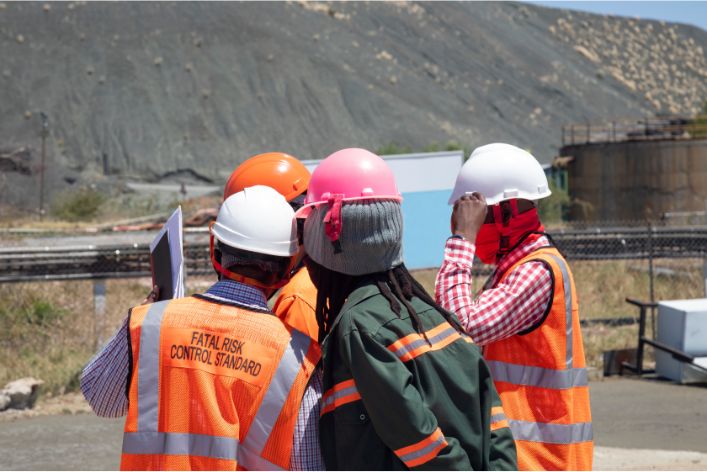Understanding the Role of Geoscientists in Nigeria’s Oil Industry
Last Updated on August 17, 2023
The oil industry is a vital sector in Nigeria, contributing significantly to the nation’s economy. One of the essential parties in the oil industry is geoscientists.
Geoscientists are professionals who study the Earth’s physical structure and processes concerning oil exploration and production.
In Nigeria’s oil industry, geoscientists perform crucial roles throughout oil production. They explore oil sites and map and predict reserve sizes. They also monitor oil wells’ production rates.
In addition, they commit to environmental protection and pollution control. Their work ensures drilling and production activities don’t harm the environment.
What are Geoscientists?
Geoscientists are professionals who study the Earth’s physical structure, processes, and composition. They play significant roles in the oil industry because of their specialized skills and expertise. Geoscientists’ work is critical in locating oil and gas resources, estimating reserves, and developing strategies for production.
Geoscientists’ specific skills and expertise
- Geological knowledge: Geoscientists have an excellent understanding of the Earth’s geology, including the study of rocks, minerals, and sediments.
- Geophysical knowledge: They have expertise in using a variety of geophysical techniques to interpret subsurface structures and processes, such as seismic data interpretation.
- Reservoir characterization: They use their knowledge of geology and geophysics to determine the characteristics of reservoirs, including their size, shape, and amount of oil and gas they contain.
- Environmental protection: Geoscientists work to minimize the environmental impact of oil and gas exploration and production activities.
Different types of geoscientists in the industry
There are various types of geoscientists in the oil and gas industry, each with a specific role to play. They include:
- Petroleum Geologists: They are responsible for identifying potential oil and gas deposits, assessing their viability, and determining the geological and environmental risks associated with exploration and production.
- Geophysicists: They use geophysical tools and methods to analyze and interpret the Earth’s subsurface to locate oil and gas reserves. They also help design and monitor the production of oil and gas wells.
- Reservoir Engineers: They are responsible for developing and implementing strategies for the optimal recovery of oil and gas from reservoirs. They use their knowledge of geological and geophysical data to design and optimize well locations, production rates, and recovery methods.
- Environmental Geoscientists: They focus on minimizing the environmental impact of oil and gas exploration and production. They assess potential environmental risks associated with oil and gas activities and develop strategies to address them.
Geoscientists play a crucial role in Nigeria’s oil industry. Their work is essential in ensuring the continued exploration and production of oil and gas in the most efficient and cost-effective manner.
Through their specialized skills and knowledge, they help identify potential oil and gas reserves, estimate their viability, and develop strategies for their production.
Additionally, they work to minimize the environmental impact of oil and gas exploration and production activities, ensuring that Nigeria’s oil industry operates in a sustainable and responsible manner.
Read: How to Become a Successful Pipeline Engineer in Nigeria
The Role of Geoscientists in Nigeria’s Oil Industry
In Nigeria’s oil industry, geoscientists play a critical role in the exploration, production, and management of crude oil. They are responsible for studying the physical, chemical, and geological characteristics of the earth, interpreting seismic data, mapping oil reservoirs, and identifying possible locations for drilling.
The Process of Exploring and Finding Oil
- Geoscientists analyze geological data to identify potential sites for oil exploration.
- They use various techniques, such as seismic exploration, to locate potential oil deposits under the earth’s surface.
- Once a potential oil deposit is identified, geoscientists use computer models and simulations to estimate the quantity and quality of oil in the deposit.
- They then determine the best drilling technique and equipment to extract oil from the deposit safely and efficiently.
Read: Role of Data Analysts in Driving Nigeria’s Oil and Gas Sector
Mapping Oil Reservoirs and Identifying Possible Locations for Drilling
- After identifying a potential site for oil exploration, geoscientists use seismic data to create a map of the oil reservoir.
- They analyze data on the geological formation, rock type, and porosity to determine the potential yield of the reservoir.
- Geoscientists also assess the environmental impact of drilling in the area and recommend measures to minimize the negative effects on the ecosystem.
- They work closely with drilling engineers and other specialists to ensure the safe and efficient extraction of oil from the reservoir.
Estimating the Quantity and Quality of Oil
- Geoscientists use various techniques, such as well logging and fluid analysis, to estimate the quantity and quality of oil in a reservoir.
- They also analyze data on the reservoir’s pressure, temperature, and fluid dynamics to develop a comprehensive understanding of the reservoir’s characteristics.
- With this information, geoscientists can determine the optimal drilling technique and equipment to extract oil from the reservoir.
- They also monitor the reservoir during production to ensure that the pressure and flow rates are maintained at optimal levels.
Monitoring Oil Production and Reservoirs
- Geoscientists monitor oil production and reservoirs to identify any potential issues that could affect oil extraction or safety.
- They analyze data on oil production rates, pressure, and other factors to detect any changes in the reservoir’s characteristics.
- If production rates decrease or the reservoir’s pressure drops, geoscientists work with engineers to determine the cause and recommend solutions.
- They also monitor the environmental impact of oil production and recommend measures to minimize negative effects on the ecosystem.
In a nutshell, geoscientists play an essential role in Nigeria’s oil industry, from exploration to production and reservoir management.
They utilize their expertise to identify potential oil deposits, create maps of oil reservoirs, estimate the quantity and quality of oil, and monitor production and reservoirs to ensure safe and efficient extraction.
With the growing demand for oil and the need for sustainable energy solutions, geoscientists’ contributions to the industry will continue to be vital.
Read: Exploring the Top Paying Oil and Gas Professions in Nigeria

Challenges Faced by Geoscientists in Nigeria’s Oil Industry
Working in Nigeria’s oil industry as a geoscientist can be a challenging endeavor. Despite the lucrative nature of the industry, geoscientists face several challenges that make their work difficult. Here are some of the challenges that geoscientists in Nigeria’s oil industry face:
Environmental Issues and Community Concerns
One of the biggest challenges that geoscientists face in Nigeria’s oil industry is environmental issues and community concerns. Oil exploration and production activities can have a significant impact on the environment and the communities that live around the oil fields.
Geoscientists are often called upon to evaluate the potential environmental impacts of oil exploration and production activities.
However, this can be a challenging task as Nigeria’s oil industry has a long history of environmental damage, which has created a legacy of mistrust between local communities and oil companies.
Technological Limitations and Outdated Equipment
Another major challenge that geoscientists in Nigeria’s oil industry face is technological limitations and outdated equipment.
Many of the tools and equipment used in oil exploration and production are outdated, which can make their work more difficult and less effective.
For instance, outdated seismic equipment can create inaccurate images of the subsurface, which can make oil exploration more challenging.
Additionally, outdated drilling equipment can increase the risk of accidents and spills, which can have significant environmental and economic impacts.
Corruption and Political Instability
Corruption and political instability are also significant challenges that geoscientists in Nigeria’s oil industry face. Also, corruption is prevalent at all levels of the oil industry, with bribes and kickbacks often used to obtain contracts and licenses.
In addition, Nigeria’s political climate can be unstable, with frequent changes in government and policies that can impact the oil industry. This can create uncertainty around investments and have a negative impact on oil exploration and production activities.
Despite Nigeria’s oil industry challenges, many geoscientists remain dedicated, seeing the industry’s potential benefits.
These challenges demand a joint effort from all stakeholders, including the government, oil companies, and local communities.
To address these, prioritizing environmental protection is key, alongside investment in new technologies and equipment.
Promoting transparency and accountability will also play a vital role in sustaining the industry and minimizing environmental impact.
Read: The Demand for Petroleum Engineers in Nigeria: A Deep Dive
The Future of Geoscientists in Nigeria’s Oil Industry
The oil industry in Nigeria has always been a significant contributor to the nation’s economic growth, and geoscientists play an integral role in the sector. However, the industry is facing new challenges, and the role of geoscientists is evolving with the changes.
Potential for Increased Investment in the Industry
Fiscal instability characterized by fluctuations in oil prices has resulted in a lack of investment from companies in Nigeria’s oil industry.
However, with the potential of oil prices rising in the future, there is a renewed prospect for investments to capitalize on the untapped reserves and exploration opportunities in the industry.
The higher investment presents an opportunity for geoscientists to play a crucial role in identifying and analyzing the potential resources.
Therefore, the future of geoscientists in Nigeria’s oil industry seems promising, with the increased demand for their skills and experience for the exploitation of these resources.
The Need for Innovation and Technology Advancements
Advancements in technology have made it possible for companies in the oil industry to explore and extract resources in areas that were once considered challenging or impossible to reach.
With the ever-increasing demand for energy, geoscientists must stay up-to-date with technological advancements in their field.
Advancements such as high-resolution imaging and 3D modeling technologies are essential tools that geoscientists can use to explore possibilities and maximize production in oil reservoirs.
As such, the need for geoscientists to keep up with the technological advancements will remain to play a crucial role in the industry’s future.
Opportunities for Geoscientists to Play a Greater Role in the Industry’s Decision-Making Process
The role of geoscientists in the oil industry varies beyond their technical expertise, as they offer valuable insight into the sector based on their experience and knowledge.
The geoscientists can serve as advisors, decision-makers, and consultants on industry-related issues, adding value to the industry and organizations.
In short, the industry trend is moving towards a more sustainable approach towards oil exploration and production. Therefore, geoscientists can offer a more significant contribution to environmental management and sustainable development in the industry.
Nigeria’s oil industry promises a bright future for geoscientists, offering increased opportunities for investment, innovation, and technological advancement.
Facing new challenges, the industry needs geoscientists to influence decision-making and contribute to sustainable development directly.
To succeed in Nigeria’s oil industry, geoscientists must stay abreast of technological advancements and maintain extensive knowledge and expertise.
Conclusion
Geoscientists play a crucial role in Nigeria’s oil industry. They use their knowledge and expertise to explore for, discover, and assess oil reserves.
They also help with the production, processing, and transportation of oil. Without geoscientists, Nigeria’s oil industry would not be as successful as it is today.
In terms of future prospects for geoscientists in the industry, the outlook is positive. As long as there is demand for oil, there will be a need for geoscientists.
With advancements in technology and exploration techniques, there will be more opportunities for geoscientists to contribute to the industry.
Additionally, many oil companies are investing in renewable energy, which may also provide opportunities for geoscientists.
Overall, geoscientists are a valuable asset to Nigeria’s oil industry, and their contributions are vital to the industry’s success. As the industry continues to evolve and grow, geoscientists will play an increasingly important role.


